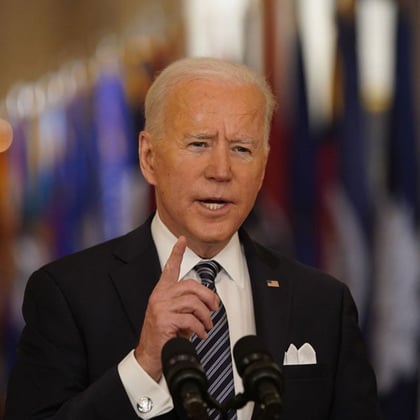Joe Biden wants to spend his way to a greener and more sustainable future for America. For now though, he’ll probably be financing it the old-fashioned way — with taxes and traditional bonds.
None of the $21 trillion Treasuries market includes bonds linked to the funding of environmentally-friendly projects, despite a seemingly insatiable investor hunger for these new types of ethical assets.
Germany, France and Italy have capitalized on it, and the U.K. and Canada are both planning debuts. In the U.S., municipalities have been selling record amounts of green bonds, but the world’s largest seller of debt is conspicuously absent.
It’s more than a little ironic. Biden needs trillions of dollars and global investors are only too happy to pour cash into the world’s safest bonds. Such debt could be splashed on new power grids to avoid the kind of chaos seen in the Texan deep freeze this year, or electric-vehicle charging for the fleet of Tesla Inc. devotees.
Yet officials haven’t publicly floated the idea of green Treasuries, with Treasury Secretary Janet Yellen saying private capital must fill most of the funding gap.
Biden’s infrastructure plans and climate agenda come at a time when green bonds have become one of the fastest-growing corners of international finance, with issuance above $200 billion so far this year.
The coronavirus crisis has accelerated the trend, since governments and companies are trying to spend their way to a recovery as well as transition to lower carbon economies. While the administration could easily raise funds from existing borrowing and taxes, debt linked to sustainability projects is a way for many issuers to signal that the money is going into good causes.
Green debt “fits the Biden agenda and investor demand would be strong,” said Ronald van Steenweghen, a money manager at Degroof Petercam Asset Management in Brussels.
In the absence of a move from the federal government, regional administrations in America have already pushed ahead.
Last year saw a record of around $20 billion of green bonds, according to data compiled by Bloomberg show and the municipal debt market may be headed for a second straight year of unprecedented environmental debt issuance, spurred in part by the conversation around Biden’s plans.
The Washington Metropolitan Area Transit Authority just sold $874 million in green bonds, while the New York Metropolitan Transportation Authority is one of the biggest issuers.
Still, that’s a small slice of the $3.9 trillion U.S. municipal market, where states and localities raise money for transport, schools and housing. And it’s minuscule compared to the behemoth that is the funding done by the U.S. Treasury, which has historically tended to take a very long time to ponder any changes to its debt lineup.
Proposals to extend bond market maturities beyond the current limit of around 30 years have been floated repeatedly and gone by the wayside, while the idea of issuing debt linked to a replacement for the discredited Libor benchmark has been kicked around for more than a year.








 June 02, 2021 at 12:36 PM
June 02, 2021 at 12:36 PM












 Copyright © 2024 ALM Global, LLC. All Rights Reserved.
Copyright © 2024 ALM Global, LLC. All Rights Reserved.